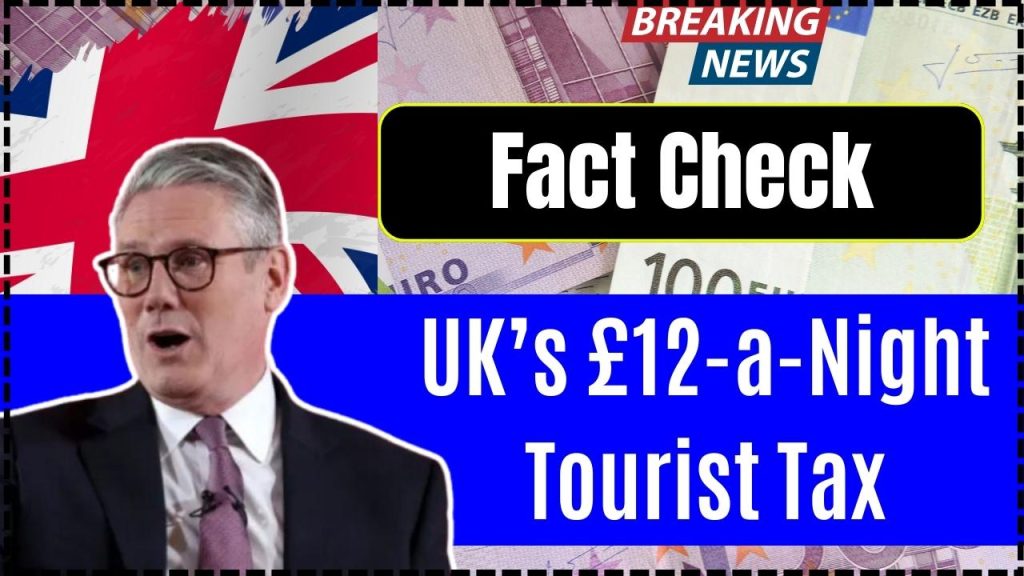
UK’s £12-a-Night Tourist Tax: Recent discussions in the UK have focused on a potential £12-a-night tourist tax, a levy aimed at generating revenue to address public spending deficits and support tourism-related infrastructure. While not yet implemented nationwide, this proposal has sparked debate among travelers, the hospitality sector, and policymakers. Understanding how this tax might work, its potential impact, and what it means for tourists is essential for anyone planning to visit the UK.
UK’s £12-a-Night Tourist Tax
The proposed £12-a-night tourist tax represents a significant development in the UK’s tourism sector. While the tax could generate substantial revenue to support public services and infrastructure, it also raises concerns about affordability and its impact on the hospitality industry. For travelers, staying informed and planning ahead are key to navigating potential changes. Whether or not the tax is implemented nationwide, it’s clear that sustainable tourism funding will remain a vital topic for the UK.
| Detail | Information |
|---|---|
| Proposed Tax Amount | £1 per person at campsites; up to £15 per person at five-star hotels |
| Purpose | To raise an estimated £1 billion annually for public spending and tourism infrastructure |
| Applicability | Both UK residents and international visitors staying in paid accommodations, including hotels, B&Bs, and campsites |
| Current Status | Under consideration; not yet implemented nationwide |
| Existing Local Taxes | Manchester’s City Visitor Charge; Edinburgh’s planned Transient Visitor Levy |
| Official Resource | UK Government’s Tourism Policy |
What Is the £12-a-Night Tourist Tax?
The £12-a-night tourist tax is a proposed levy ranging from £1 to £15 per person per night, depending on the type of accommodation. This initiative aims to generate £1 billion annually, which could be used to fund public services, maintain tourist attractions, and support sustainable tourism efforts.
If introduced, the tax would apply to both domestic and international visitors staying in paid accommodations such as hotels, bed and breakfasts, and campsites.
How It Compares to Existing Local Taxes?
Although a nationwide tourist tax has not been introduced, some UK cities have implemented local levies:
- Manchester: Guests pay a City Visitor Charge of £1 per room per night, aimed at funding tourism marketing and improving the visitor experience.
- Edinburgh: Plans to introduce a Transient Visitor Levy (TVL) charging £2 per night for stays in short-term accommodations. The revenue will be invested in city maintenance and tourism infrastructure.
These city-specific initiatives provide a glimpse of what a nationwide tax might look like.
Economic Analysis: Potential Benefits and Drawbacks
Benefits of the Proposed Tax:
- Increased Revenue: The estimated £1 billion annual revenue could support public spending and infrastructure projects.
- Sustainable Tourism: Funds could be allocated to reduce the environmental impact of tourism, such as by improving waste management and public transport.
- Enhanced Tourist Experience: Investments in maintaining historical landmarks and cultural attractions could enhance the overall visitor experience.
Drawbacks of the Proposed Tax:
- Higher Travel Costs: Tourists may face increased accommodation expenses, potentially discouraging visits.
- Economic Impact on Hospitality: Local businesses reliant on tourism might see a decline in bookings due to the added cost.
- Implementation Challenges: Ensuring consistent application and collection across all regions and accommodation types could be complex.
Case Studies: Tourist Taxes in Other Countries
Several nations have implemented tourist taxes successfully, providing lessons for the UK:
- Spain: Tourists in regions like the Balearic Islands pay between €0.25 and €3.50 per person per night, with the revenue used to fund sustainable tourism initiatives.
- Italy: Cities like Venice and Rome impose taxes ranging from €1 to €7 per night, helping preserve cultural landmarks and manage tourist crowds.
- France: Charges vary from €0.20 to €4.20 per night, with funds supporting local tourism infrastructure.
These examples demonstrate how tourist taxes can positively impact destinations when managed effectively.
Public Opinion on the UK’s £12-a-Night Tourist Tax
Public sentiment around the proposed tax is mixed. According to a recent survey:
- Supporters: Approximately 60% of UK residents believe a tourist tax could benefit local economies and improve public services.
- Opponents: Many travelers express concerns about affordability, especially for families and budget-conscious tourists.
Hospitality industry leaders have voiced fears about reduced competitiveness compared to destinations without such levies.
Alternatives to a Tourist Tax
Instead of introducing a nationwide tax, the government could consider alternatives to raise revenue, such as:
- Increasing VAT on Luxury Accommodations: Targeting high-end stays might reduce the financial burden on budget travelers.
- Corporate Contributions: Encouraging businesses benefiting from tourism to contribute to infrastructure funding.
- Seasonal Pricing Models: Adjusting rates during peak tourist seasons to manage demand and generate revenue.
Practical Tips for Travelers
To prepare for the potential introduction of a tourist tax:
- Plan Your Budget: Include possible tourist taxes in your travel expenses to avoid surprises.
- Check Local Policies: Research whether your destination city has specific levies.
- Explore Alternatives: Consider staying in regions without tourist taxes or opting for budget accommodations.
DWP Offers £812 Budgeting Loans – Get it without any Interest, Check Details
Pensioners to Receive £175 Winter Fuel Boost – Check Eligibility, Date
UK Minimum Wage Update for 2025: How Much Will Workers Earn?
Frequently Asked Questions (FAQs)
Q1: Is the £12-a-night tourist tax currently in effect?
No, the tax is a proposal under consideration and has not been implemented nationwide.
Q2: Which cities in the UK currently have a tourist tax?
Manchester has implemented a City Visitor Charge, and Edinburgh plans to introduce a Transient Visitor Levy in the near future.
Q3: Will the tourist tax apply to all accommodations?
If implemented, the tax would apply to all paid accommodations, including hotels, B&Bs, and campsites.
Q4: How much will the tourist tax cost per night?
The proposed rates range from £1 per person per night at campsites to £15 per person per night at five-star hotels.






